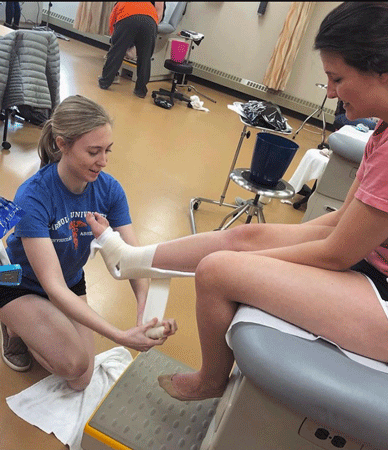 Ciara Neeb '21
Growing up in a rural farming community in south central Wisconsin, Ciara Neeb '21 couldn’t help but notice that her neighbors had limited access to healthcare providers. When she began rotations as a physician assistant (PA) graduate student at Carroll University, Neeb felt increasingly compelled to dedicate her career to providing health services in marginalized communities.
Ciara Neeb '21
Growing up in a rural farming community in south central Wisconsin, Ciara Neeb '21 couldn’t help but notice that her neighbors had limited access to healthcare providers. When she began rotations as a physician assistant (PA) graduate student at Carroll University, Neeb felt increasingly compelled to dedicate her career to providing health services in marginalized communities.
“Having a deeper understanding of patients with different backgrounds helps me better understand specific hardships and develop more effective treatment plans for them,” Neeb said.
Neeb is a proud ambassador for the
National Health Career Opportunity Program (HCOP) Academy. In 2018, the Health Resources and Services Administration (HRSA) awarded Carroll a $2,893,722 grant to start the HCOP Academy to recruit educationally underserved students interested in health professions.
Today, the five-year grant continues to provide scholarships that help students like Neeb with their health career pursuits. The academy creates support systems for high school students in underrepresented populations, preparing them for collegiate allied health programs. The goal is for graduates to work in medically underserved communities in primary care professions after graduation.
“We work closely with health sciences faculty to advocate for the needs of underrepresented students,” said Barbra Beck, Carroll’s public health program director. “The academy provides networking and job shadowing opportunities, and invests in pre-college programming.”
In 2018, the academy supported 17 health sciences students in undergraduate and graduate programs. Since then, the program has grown to support 48 students, including 27 high school ambassadors.
“The multitude of courses, discussions and presenters will definitely make me a more well-rounded provider,” Neeb said. “My experience gave me a much greater understanding of the struggles many people face with less access to healthcare.”
Right now, 83 percent of health sciences graduates express interest in working in a medically underserved community.
Upon graduation in spring 2021, Neeb accepted a position providing psychiatric services in rural communities across Alaska, North Dakota, South Dakota and Minnesota.
“My experience will forever shape the type of PA I will be for my patients,” said Neeb. “I will always advocate for rural, underserved communities throughout my career — and long afterwards.”